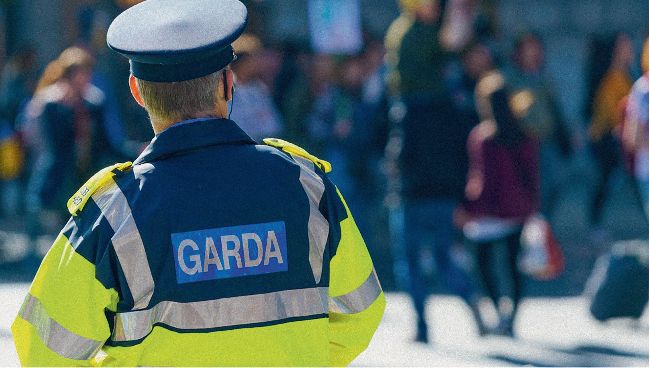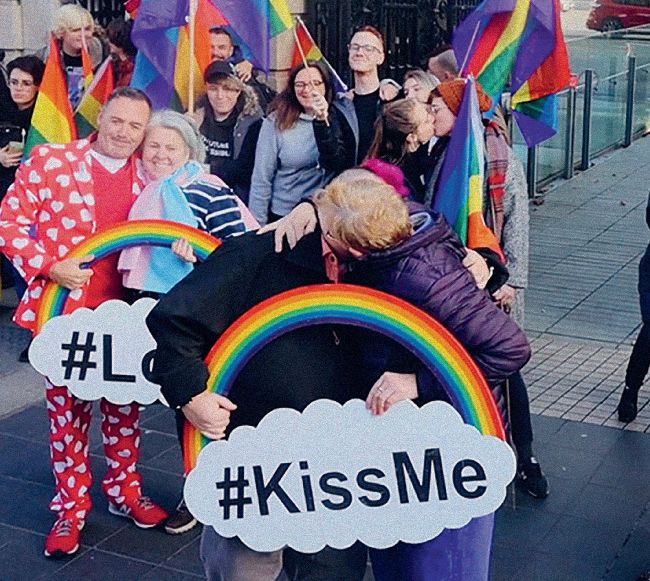Law of the Land
In 2019, a University of Limerick report stated that Ireland was failing in its obligations in relation to hate crime. Here we are at the start of a new decade, yet what changes have occurred? Patrick McDonagh takes a deeper look.
Patrick McDonagh
In May 1980, during the course of reaching out to individuals seeking their support for the decriminalisation of sexual activity between males in Ireland, David Norris received the following response from one individual: “I write to inform you that it is my considered opinion that all homosexuals should be shot.”

In the context of 1980’s Ireland, this response might not have come as too much of a surprise to Norris. It was, after all, a time when the Irish government was defending the laws which criminalised sexual activity between males, and the hierarchy of the Irish Roman Catholic Church could unashamedly declare that homosexual acts were “morally evil” - something the Irish judiciary would later support. It was a time when five individuals could walk free from court despite being found guilty of killing an individual simply because they believed he was gay – their defence being that they were trying to clear the park of queers who they understood went “after children from five years and up”. It was a time in which one could spout ignorant vitriolic comments about minorities without any fear of prosecution.
Today, many justifiably claim that the climate is dramatically different to when Norris received the aforementioned reply to his letter or when the five youths walked free from court. Ireland has come a long way in terms of how it treats minorities. It is a much more multi-cultural and diverse society and is all the better for it. As a result of the 2015 marriage equality referendum, Ireland is now seen as a beacon for LGBT+ rights throughout the world; the first country to introduce same-sex marriage by popular vote. Moreover, our current Taoiseach is an openly gay man whose father comes from India, and Ireland now respects a woman’s right to control her own body following the repeal of the Eighth Amendment in 2018. For many individuals who grew up in Ireland pre-1993, such a transformation was unimaginable in their lifetime. The change has been rapid.
With all the progress that has occurred in recent years, one could be forgiven for thinking that the work is done. Many might believe that we have left the type of vitriol and discrimination that LGBT+ individuals and other minorities were subjected to in previous decades in the past. This, however, is far from the reality.
Recently a number of reports have made for alarming reading. The 2016 LGBT Ireland Report: National Study of the Mental Health and Wellbeing of Lesbian, Gay, Bisexual, Transgender and Intersex People in Ireland, while revealing that a large proportion of LGBT+ people are experiencing positive wellbeing nevertheless showed that rates of self harm are twice as high and attempted suicide three times higher among young LGBT+ people compared to their non-LGBT+ peers.
More recently, a July 2018 report by the Irish Council for Civil Liberties worryingly revealed that Ireland has the highest rates of hate crime against people of African background and transgender people in the European Union. Furthermore, in the period between 2006-2014 An Garda Síochána recorded an average of 158 crimes with a discriminatory motive per year; the largest number of crimes with a discriminatory motive were identified as racist.
The aforementioned figures, however, are only the tip of the iceberg, as the majority of those affected by hate motivated harassment/violence do not report the incident to the police. Is it any wonder though that so few report hate motivated harassment/violence, when, unlike our European counterparts, Ireland has no hate crime law, with the exception of the Prohibition of Incitement to Hatred Act 1989, which has proven to be wholly ineff ective. As a result, the ICCL argues that “there is currently no legislation in Ireland which requires a court to take a bias motivation, or a demonstration of bias, into account when determining the appropriate sanction to impose in a given case”. We should not be surprised, therefore, that Ireland fairs poorly in comparison to its EU counterparts.
The Organisation for Security and Co-operation in Europe defines hate crime as “criminal acts motivated by bias or prejudice towards particular groups of people. Bias motivation can be broadly defined as preconceived negative opinions, stereotypical assumptions, intolerance or hatred directed to a particular group that shares a common characteristic, such as race, ethnicity, language, religion, nationality, sexual orientation, gender or any other fundamental characteristic”. Dr Amanda Haynes, author of Lifecycle of a Hate Crime: Country Report for Ireland, argues that “hate crime simply is not part of the language of the Irish criminal justice process”.
With no hate crime law, victims in Ireland have had to rely on the Prohibition of Incitement to Hatred Act 1989, an act which European Network Against Racism Ireland claims is “not fifor purpose”. As it stands the Act makes it an off ence “to publish or distribute material, to use words, behave or display written material, or to distribute, show or play a recording of visual images or sounds which are threatening, abusive or insulting and are intended or, having regard to all the circumstances, are likely to stir up hatred”. The Act narrowly defines hatred as “hatred against a group of persons in the State or elsewhere on account of their race, colour, nationality, religion, ethnic or national origins, membership of the travelling community or sexual orientation”. The requirement to prove beyond reasonable doubt that there was an intent to incite hatred, however, has resulted in only a handful of convictions. According to a 2017 Irish Times article there have been just five convictions under this legislation since it was introduced - a clear indictment of just how weak the current legislation is.
The Prohibition of Incitement to Hatred Act is a product of its time, when Irish society was much diff erent. In introducing the Bill to the Irish parliament in 1988, then Minister for Justice, Gerry Collins, remarked that, “We do not have the type of multi-racial society that some of our partners in Europe have. Nevertheless, we cannot close our eyes to the fact that the occasional problem of racial incitement does arise here”. As a result, Collins took a very narrow view of what needed to be included in the Bill, originally limiting it to an off ence to incite hatred on account of race, colour, nationality, religion or ethnic or national origins. Only after considerable lobbying did he relent and include the travelling community in the Bill, however, he steadfastly defended the exclusion of sexual orientation, something Senator David Norris argued was a “disastrous limitation in the Bill”.
Norris and other members of the gay rights movement in Ireland had lobbied for the inclusion of sexual orientation, noting in particular the context of HIV/AIDS and the hysteria in the media which had linked homosexuality and AIDS. In an attempt to demonstrate the level of harassment and violence homosexual individuals were subjected to, Norris presented a leaflet to Seanad Éireann which had been distributed in Dublin in 1985, called Smash AIDS Blitzkrieg. The leaflet, published by the National Socialist Party, noted that “In Ireland, AIDS is being spread amongst all normal people by the gay AIDS spreaders and the junkies” and proposed the following solutions to combat AIDS: “Enforce the law – ten years for homosexuals. Enforce stringent AIDS-testing on all immigrants. Intern all junkies, pushers, etc, as enemies of the people. Suspect discos, gay bars, clubs etc to be burned down. Execution of deliberate AIDS-spreaders.”
Coincidentally, the Hirschfeld Centre, Ireland’s main gay community centre, was burnt down in 1987, bringing to an end one of the few spaces in Ireland that openly welcomed LGBT+ individuals.
It was not until Gerry Collins was replaced as Minister for Justice by Ray Burke in 1989 that sexual orientation was finally included in the Bill. In an enlightened speech, Burke explained his reasons for doing so on the basis that “It is of little or no benefit to these people merely to say that sympathise with them when they are verbally attacked if am not prepared to do something about it when the opportunity arises […] There would be, in the absence of this amendment, an opportunity for bigoted and unscrupulous persons to latch on to the prevalence of AIDS for example to incite hatred against homosexuals in a totally unfair manner. In fact, believe there are examples of this already happening and am glad to be able to do something that should put a stop to it”. The decision to include sexual orientation was historic; it was the first time Irish parliamentarians had approved a measure in favour of homosexuals and it was widely welcomed.
In 2020, we need a new historic act, an act that actually works and applies to more than those included in the 1989 Act. Transgender and intersex individuals, for example, are not covered under existing legislation, yet Ireland’s transgender community are one cohort who are most in need of protection in this regard. We need an act that sends a clear message that hatred of any sort will not be tolerated in Ireland, an act that will empower victims to report a crime and feel confident that justice will be served. We need an act that affirms an individual’s right to live in a society without fear of harassment or violence simply because of who they are. We need an act that will actually prosecute those who incite hatred.

We should not become complacent in Ireland just because we have made many important strides in recent years. We only need to look at certain regions in the world to see that advancements for LGBT+ individuals can in fact be rolled back, or seriously challenged. For example -Poland, a member of the European Union, has only recently seen certain regions introduce LGBT+ free zones – this is not something which should be tolerated in the 21st Century. In Ireland, a small fringe has recently mobilised and begun scapegoating immigrants, refugees, asylum seekers and LGBT+ individuals, amongst others. Although this is currently limited to a small cohort, we need to ensure that their hateful rhetoric does not become mainstream and that they feel empowered to spread hatred. While many will seek to claim that hate crime legislation is a means of restricting freedom of speech, this is not the case. No one should have the right to incite hatred. Hate speech/hate crime has real consequences, not only for the individual targeted but also for the wider society.
Speaking in 2018, Emily Logan, Chief Commissioner of the Irish Human Rights and Equality Commission, warned that “hate crime can cause people to withdraw from society and avoid expressing their identity. When unchallenged, hate crime carries consequences well beyond the immediate victim. It has the power to act as a message crime – the ability to send out a message to an entire community – to warn off those who stray from the norm… It is not the responsibility of victims to avoid being targets of hate crime: the State, as the principal duty bearer – has a responsibility to send a clear message to society that hate crime is not tolerated”.
We can only hope that public consultations recently concluded by the Department of Justice will lead to the introduction of a workable and effective piece of hate crime legislation in Ireland. Failure to introduce such legislation could, as Logan noted, have dire consequences not only for the victims, but for the type of society we want to live in.
In this Decade of Centenaries we should seek to live up to the ideals of the 1916 Proclamation and cherish all the children of the nation equally.